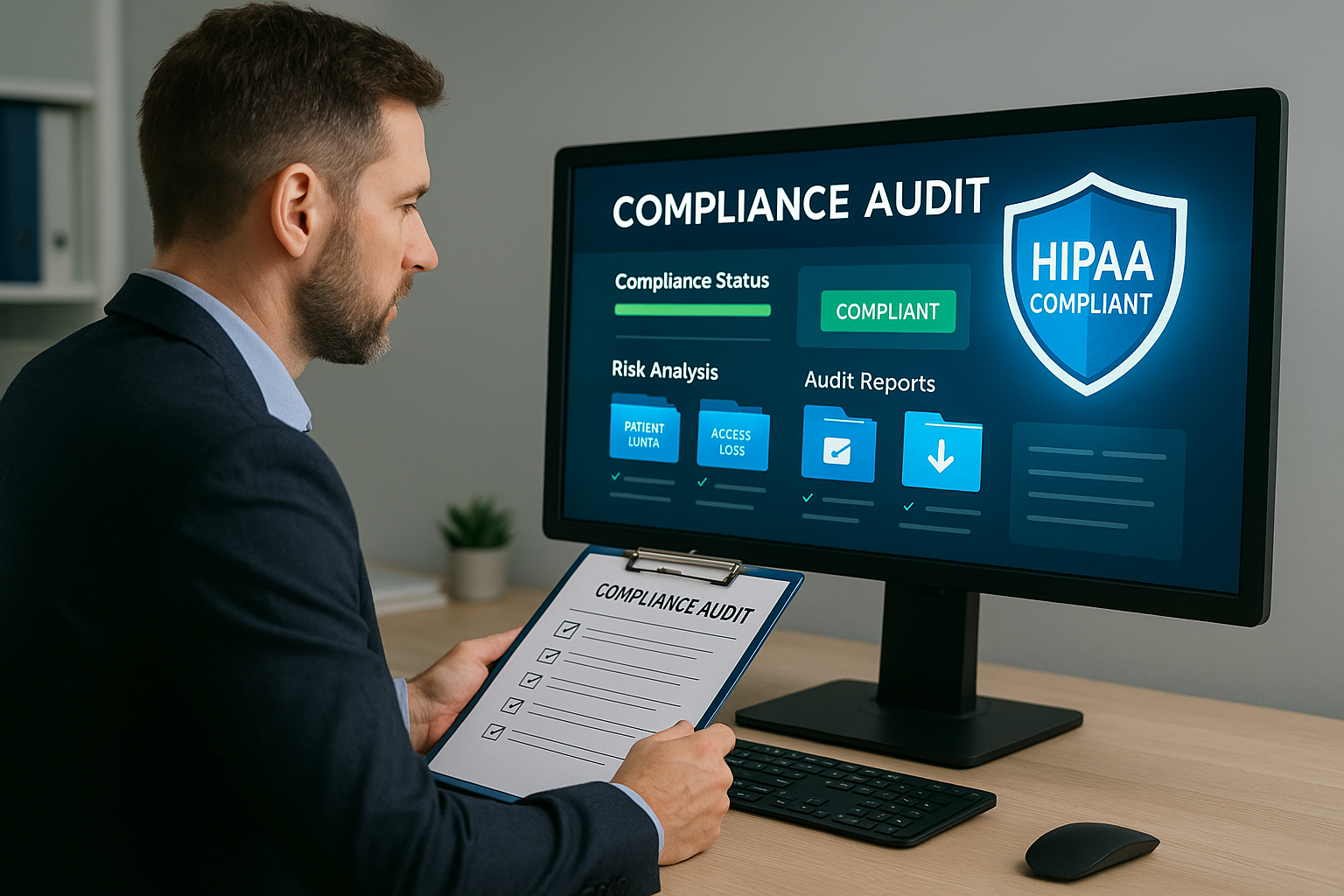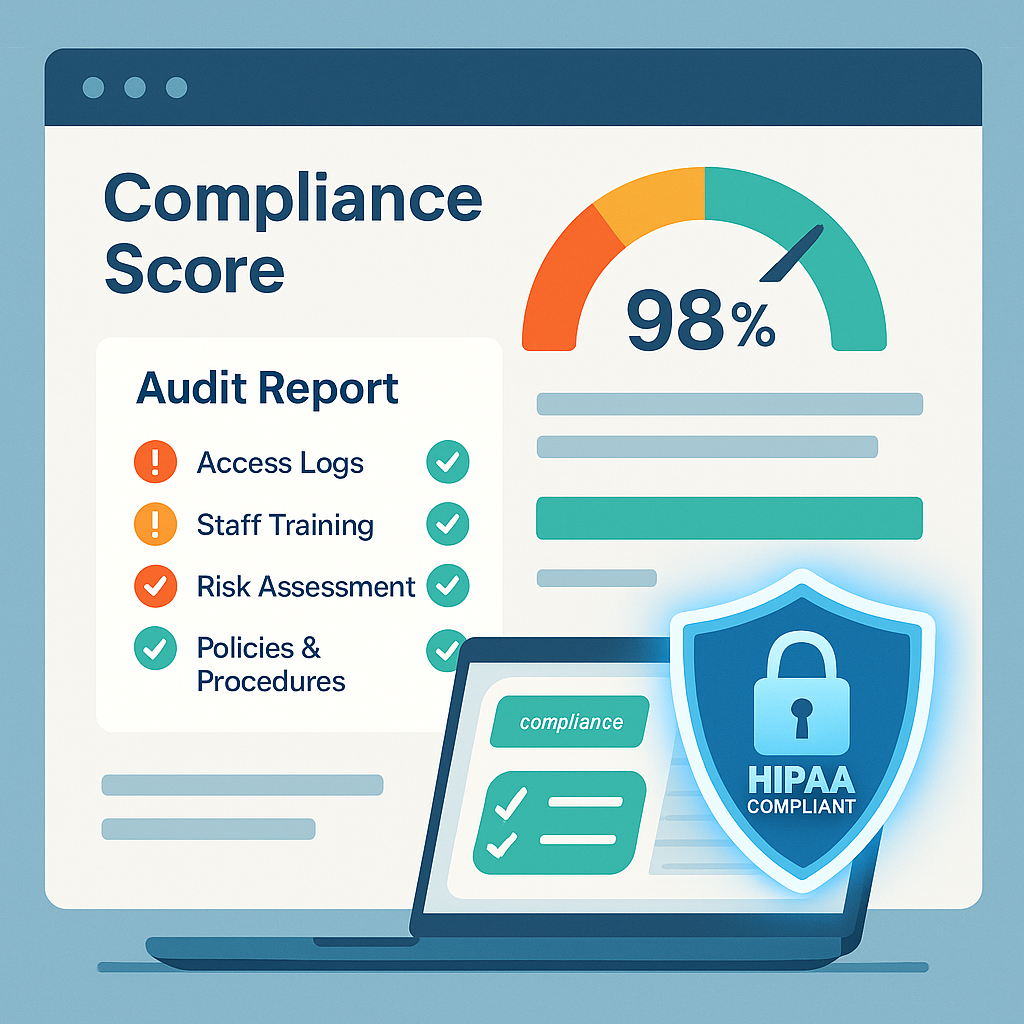HIPAA Compliance Auditing Services
Comprehensive compliance assessments and ongoing monitoring to ensure your healthcare organization meets all regulatory requirements.

Ensuring Healthcare Compliance
Our compliance auditing services help healthcare organizations identify and address compliance gaps, reduce risk, and maintain regulatory compliance.
Healthcare organizations face complex regulatory requirements, with HIPAA being just one of many compliance frameworks. Our comprehensive compliance auditing services help you navigate these requirements, identify gaps in your current practices, and implement solutions to achieve and maintain compliance.

Comprehensive Compliance Auditing for Healthcare
Our compliance auditing services are designed specifically for the unique needs of healthcare organizations.
Our HIPAA risk assessments provide a thorough evaluation of your organization's compliance with all aspects of HIPAA regulations.
- Privacy Rule assessment
- Security Rule assessment
- Breach Notification Rule assessment
Our gap analysis identifies areas where your organization falls short of compliance requirements, and we provide detailed remediation plans to address these gaps.
- Detailed compliance gap identification
- Prioritized remediation recommendations
- Implementation assistance
We develop comprehensive policies and procedures that meet regulatory requirements and reflect your organization's specific practices.
- HIPAA-compliant policy templates
- Customized to your organization
- Regular policy updates
Our security risk analysis identifies vulnerabilities in your systems and processes that could lead to data breaches or compliance violations.
- Technical vulnerability assessment
- Administrative safeguard evaluation
- Physical security assessment
Our training programs ensure your staff understands compliance requirements and their role in maintaining compliance.
- HIPAA awareness training
- Role-specific compliance training
- Ongoing education and updates
Our ongoing monitoring services help you maintain compliance over time, adapting to regulatory changes and organizational growth.
- Regular compliance check-ins
- Regulatory update notifications
- Annual reassessments
How Our Compliance Auditing Process Works
We follow a structured approach to assessing and improving your organization's compliance posture.
Initial Assessment
We conduct a comprehensive assessment of your current compliance status, including policies, procedures, and technical safeguards.
Gap Analysis
We identify gaps between your current practices and regulatory requirements, prioritizing them based on risk and impact.
Remediation
We develop and implement a remediation plan to address identified gaps, including policy development, technical controls, and staff training.
Ongoing Monitoring
We provide ongoing monitoring and support to ensure continued compliance, adapting to regulatory changes and organizational growth.
Success Story
See how we helped a healthcare provider achieve and maintain HIPAA compliance.
Behavioral Health Practice
A growing behavioral health practice with 15 therapists needed to ensure HIPAA compliance as they expanded their services and adopted new technologies.
Challenges:
- Outdated compliance policies
- Lack of formal security risk analysis
- Inconsistent staff training on HIPAA requirements
Solution:
- Comprehensive HIPAA risk assessment
- Development of updated policies and procedures
- Staff training program and ongoing compliance monitoring
Results:
- Full HIPAA compliance documentation
- Improved staff awareness and compliance practices
- Confidence in regulatory compliance during growth

Frequently Asked Questions
Common questions about our compliance auditing services for healthcare.
HIPAA requires that covered entities conduct a risk assessment when there are significant changes to the organization or its environment. However, we recommend conducting a comprehensive assessment at least annually, with more frequent targeted assessments when implementing new systems or workflows.
HIPAA requires numerous documents, including but not limited to: privacy and security policies and procedures, risk assessment documentation, business associate agreements, breach notification procedures, employee training records, and access control policies. Our compliance auditing service helps you develop and maintain all required documentation.
If our audit identifies compliance gaps, we work with you to develop and implement a remediation plan. The goal is to address these issues before they result in regulatory penalties or data breaches. We prioritize findings based on risk level and provide clear guidance for remediation.
Healthcare regulations evolve over time, and changes can impact your compliance status. Our ongoing monitoring service keeps you informed of regulatory changes and helps you adapt your policies, procedures, and technical controls to maintain compliance as requirements change.
Ready to Ensure Your Healthcare Organization's Compliance
Contact us today for a free initial compliance assessment and discover how our compliance auditing services can help your healthcare organization achieve and maintain regulatory compliance.
